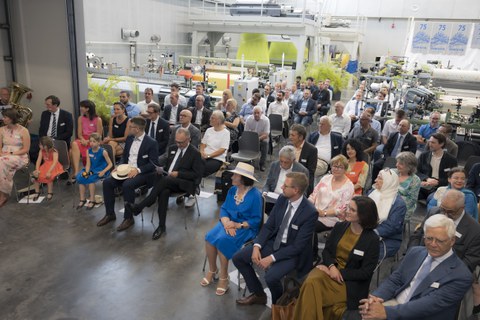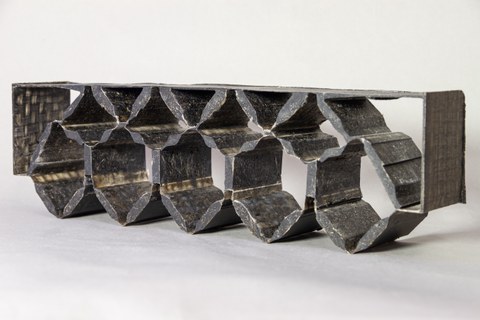Jul 30, 2025
From the Venus flytrap to foldable aircraft wings: Peter Dornier Foundation Prize 2025 honours bionic research on 3D weaving technology
Nature as a role model, 3D weaving technology as the key: for their work on foldable aircraft wings, Dr. Patrick Meyer and Dr. Michael Vorhof have been awarded the Peter Dornier Foundation Prize 2025.
Long wings with foldable tips have the potential to reduce aircraft fuel consumption and make aviation more sustainable. An interdisciplinary research team has now developed a new solution based on the Venus flytrap: Freely movable wingtips made of fibre composites which are produced using innovative 3D weaving technology. For this pioneering combination of textile technology, aviation and bionics, researchers Patrick Meyer (TU Braunschweig) and Michael Vorhof (TU Dresden) were awarded the Peter Dornier Foundation Prize 2025 in mid-July.
Carnivorous plant serves as a role model
In principle, the Venus flytrap works like a hydraulic system: as soon as an insect falls into the trap, the plant closes its leaves in a fraction of a second by specifically changing the pressure in its cell walls. These so-called nastic movements form the basis of ‘PACS’ (Pressure-Actuated Cellular Structures) – a still young technology that is essentially based on research work at the TU Braunschweig and the German Aerospace Centre. ‘In principle, PACS is a technical replica of the mechanics of the Venus flytrap and has precisely the properties that robust yet easily manoeuvrable wingtips need.’ To implement the PACS concept for his idea of controllable wingtips, Meyer teamed up with textile researcher Dr Michael Vorhof from the Institute of Textile Machinery and High Performance Materials Technology at TU Dresdent. ‘Plants are made of fibres – if you want to copy them, you also have to copy their complex, fibre-based structure,’ explains Vorhof.
3D weaving paves the way for sustainable aviation
In order to transfer the complex structure and mechanics of the Venus flytrap into a woven and movable wingtip that can be bent by changing the pressure, Vorhof used a weaving machine from machine and plant manufacturer Lindauer DORNIER GmbH, whose 75th anniversary is being celebrated this year. 'The robust design, the composite-compatible layout and the high precision of the DORNIER weaving machine were crucial in helping us to implement the complex fibre structure required for PACS,' says Vorhof. The woven semi-finished products consist of glass fibre and polyamide threads and are melted in a thermo press to form the fibre composite plastic component. ‘This is significantly cheaper than using an autoclave,’ says Vorhof.
The Peter Dornier Foundation Prize
The idea of the Peter Dornier Foundation Prize goes back to Peter Dornier (1917-2002), the founder of Lindauer DORNIER GmbH. Since 2021, the prize has been awarded to young people for outstanding scientific work in the fields of textile, film and composite technology as well as aviation. Funding medical research is just as much a part of the foundation's purpose as supporting hospices for a self-determined and dignified life until the end.



